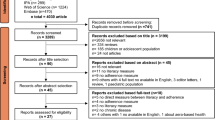Abstract
Health literacy is the degree to which individuals have the capacity to obtain, process, communicate, and understand basic health information and services needed to make health decisions effectively. Adequate health literacy is essential for the optimal management of rheumatic diseases due to their multi-organ involvement and complex medication regimens. We review a recent quality assurance study which utilized a universal precautions health literacy approach and demonstrated significant improvement in medication adherence among patients with rheumatic diseases.

Similar content being viewed by others
Abbreviations
- AHRQ:
-
Agency for Healthcare Research and Quality
- CDAI:
-
clinical disease activity index
- PDC:
-
proportions of days covered
- DMARDs:
-
disease-modifying anti-rheumatic drugs
References
Institute of Medicine Committee on Health L. In: Nielsen-Bohlman L, Panzer AM, Kindig DA, editors. Health literacy: a prescription to end confusion. Washington (DC): National Academies Press (US); 2004.
Kutner M GE, Jin Y, Paulsen C. The health literacy of America’s adults: results from the 2003 National Assessment of Adult Literacy. 2003.
Berkman ND, Sheridan SL, Donahue KE, Halpern DJ, Crotty K. Low health literacy and health outcomes: an updated systematic review. Ann Intern Med. 2011;155(2):97–107.
Kalichman SC, Pope H, White D, Cherry C, Amaral CM, Swetzes C, et al. Association between health literacy and HIV treatment adherence: further evidence from objectively measured medication adherence. J Int Assoc Physicians AIDS Care (Chic). 2008;7(6):317–23.
Fabbri M, Yost K, Finney Rutten LJ, Manemann SM, Boyd CM, Jensen D, et al. Health literacy and outcomes in patients with heart failure: a prospective community study. Mayo Clin Proc. 2018;93(1):9–15.
Bailey SC, Fang G, Annis IE, O’Conor R, Paasche-Orlow MK, Wolf MS. Health literacy and 30-day hospital readmission after acute myocardial infarction. BMJ Open. 2015;5(6):e006975.
Morrison AK, Schapira MM, Gorelick MH, Hoffmann RG, Brousseau DC. Low caregiver health literacy is associated with higher pediatric emergency department use and nonurgent visits. Acad Pediatr. 2014;14(3):309–14.
Rebeiro PF, McPherson TD, Goggins KM, Turner M, Bebawy SS, Rogers WB, et al. Health literacy and demographic disparities in HIV care continuum outcomes. AIDS Behav. 2018;22(8):2604–14.
Tormey LK, Reich J, Chen YS, Singh A, Lipkin-Moore Z, Yu A, et al. Limited health literacy is associated with worse patient-reported outcomes in inflammatory bowel disease. Inflamm Bowel Dis. 2019;25(1):204–12.
Vernon JA, Trujillo, A., Rosenbaum, S., & DeBuono, B. . Low health literacy: implications for national health policy. Department of Health Policy, School of Public Health and Health Services, The George Washington University. 2007.
Hirsh J, Wood P, Keniston A, Boyle D, Quinzanos I, Caplan L, et al. Universal health literacy precautions are associated with a significant increase in medication adherence in vulnerable rheumatology patients. ACR Open Rheumatol. 2020;2(2):110–8.
Callahan LF, Hawk V, Rudd R, Hackney B, Bhandari S, Prizer LP, et al. Adaptation of the health literacy universal precautions toolkit for rheumatology and cardiology - applications for pharmacy professionals to improve self-management and outcomes in patients with chronic disease. Res Soc Adm Pharm. 2013;9(5):597–608.
Brega A, Barnard J, Mabachi N, et al. AHRQ Health Literacy Universal Precautions Toolkit. Rockville, MD: Agency for Healthcare Research and Quality, Rockville, MD. https://psnet.ahrq.gov/resources/resource/18204 [
Mary A, Boursier A, Desailly Henry I, Grados F, Séjourné A, Salomon S, et al. Mobile phone text messages and effect on treatment adherence in patients taking methotrexate for rheumatoid arthritis: a randomized pilot study. Arthritis Care Res. 2019;71(10):1344–52.
Taibanguay N, Chaiamnuay S, Asavatanabodee P, Narongroeknawin P. Effect of patient education on medication adherence of patients with rheumatoid arthritis: a randomized controlled trial. Patient Prefer Adherence. 2019;13:119–29.
Paasche-Orlow MK, Wolf MS. The causal pathways linking health literacy to health outcomes. Am J Health Behav. 2007;31(Suppl 1):S19–26.
Hemming K, Haines TP, Chilton PJ, Girling AJ, Lilford RJ. The stepped wedge cluster randomised trial: rationale, design, analysis, and reporting. BMJ. 2015;350:h391.
Brown DR, Ludwig R, Buck GA, Durham D, Shumard T, Graham SS. Health literacy: universal precautions needed. J Allied Health. 2004;33(2):150–5.
DeWalt DA, Broucksou KA, Hawk V, Brach C, Hink A, Rudd R, et al. Developing and testing the health literacy universal precautions toolkit. Nurs Outlook. 2011;59(2):85–94.
Batterham RW, Buchbinder R, Beauchamp A, Dodson S, Elsworth GR, Osborne RH. The OPtimising HEalth LIterAcy (Ophelia) process: study protocol for using health literacy profiling and community engagement to create and implement health reform. BMC Public Health. 2014;14:694.
Beauchamp A, Batterham RW, Dodson S, Astbury B, Elsworth GR, McPhee C, et al. Systematic development and implementation of interventions to OPtimise Health Literacy and Access (Ophelia). BMC Public Health. 2017;17(1):230.
Availability of Data and Materials
Not applicable
Code Availability
Not applicable
Funding
Kai Sun received support from the Duke Center for REsearch to AdvanCe Healthcare Equity (REACH Equity) Career Development Award (NIH 5U54MD012530-02).
Author information
Authors and Affiliations
Contributions
MM and KS both analyzed and interpreted the original study for this commentary. MM was a major contributor in writing the manuscript and KS substantively revised it. Both authors read and approved the final manuscript.
Corresponding author
Ethics declarations
Ethics Approval
Not applicable
Consent to Participate
Not applicable
Consent for Publication
Not applicable
Conflict of Interest
The authors declare no competing interests.
Additional information
Publisher’s Note
Springer Nature remains neutral with regard to jurisdictional claims in published maps and institutional affiliations.
This article is part of the Topical Collection on Medicine
Rights and permissions
About this article
Cite this article
Maheswaranathan, M., Sun, K. Implementation of a Health Literacy Intervention Improves Medication Adherence in Rheumatology Clinics. SN Compr. Clin. Med. 3, 1551–1554 (2021). https://doi.org/10.1007/s42399-021-00901-8
Accepted:
Published:
Issue Date:
DOI: https://doi.org/10.1007/s42399-021-00901-8




